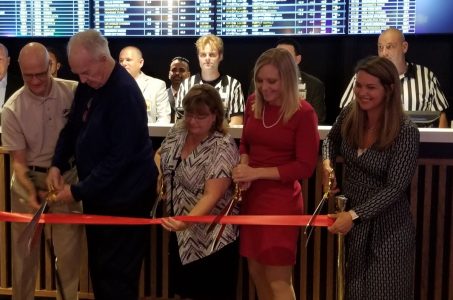Several Pennsylvania Casinos Ban Inside Smoking Over Health Concerns
Posted on: July 4, 2020, 01:58h.
Last updated on: July 6, 2020, 11:55h.
Multiple Pennsylvania gaming properties are now smoke-free after recent directives from state regulators to improve worker and player health.

Among them is The Meadows Racetrack & Casino, located in Washington, which announced on social media that smoking was “phased out in the casino.” It reopened Saturday morning, July 4, “as a 100% smoke-free facility.”
The decision was made after an order from the Pennsylvania Gaming Control Board and the Pennsylvania Department of Health, according to WPXI, a local TV station.
Another Pennsylvania TV station, WGAL, reported that Hollywood Casino, located in Grantville, also banned smoking. It also follows a decision by the Department of Health and Gaming Control Board.
For visitors who want to smoke, there are two covered outdoor areas where smoking is allowed at Hollywood.
Parx Casino, located in Bensalem, has temporarily limited smoking to an outdoor patio near a beer garden, according to the Burlington County Times, a local newspaper. Previously, Parx let players who had masks with them smoke at a smoking area near the slot machines. Smoking was banned previously at table games.
“After careful consideration and in order to support mask-wearing mandates at all Pennsylvania casinos, Parx Casino has decided to temporarily suspend indoor smoking anywhere on the casino floor,” according to a recent casino statement.
Also, Presque Isle Downs & Casino is temporarily prohibiting smoking inside the casino. The ban is “an effort to better protect our team and guests from the spread of COVID-19,” according to a casino statement.
Smokers can use a covered patio located near the venue’s main entrance, the Erie Times-News, a local newspaper, reported.
The Wind Creek Bethlehem additionally banned smoking on the casino floor or in any other public spaces or restrooms. Smokers can use a space outside, reported The Morning Call, an Allentown newspaper.
Smoking, Food, Drink Prohibition In Atlantic City
Most gaming properties in nearby Atlantic City, New Jersey reopened late this week, and are also banning smoking indoors. The gaming floor prohibition extends to food and drinks, too, according to the Philadelphia Inquirer.
The Hard Rock, Ocean, Resorts, Tropicana, and Golden Nugget reopened Thursday. Caesars, Bally’s, and Harrah’s resumed many operations on Friday.
The Borgata remains closed. It had planned to reopen, but chose to stay closed after New Jersey Gov. Phil Murphy banned indoor dining, the Inquirer reported.
Elsewhere, San Manuel — one of the largest tribal casinos in Southern California — reopened on June 15. Smoking there is restricted to designated areas, which, for now, are outside of the casino. Washington state’s Angel of the Winds casino also reopened with a smoking ban in place.
Officials Warn About Smoking Dangers
When reached for comment on Angel of the Winds casino’s smoke-free initiative, Cathy Callaway, director of state and local campaigns for the American Cancer Society Cancer Action Network, told Casino.org earlier this year that “During a time when we are all in close quarters with loved ones, it is vital to protect people from exposure to secondhand smoke and e-cigarette aerosol.
“The American Cancer Society Cancer Action Network supports 100% smoke-free workplaces that protect workers and patrons from the harms of secondhand smoke, including e-cigarette aerosol. According to the Surgeon General, there is no safe level of secondhand smoke exposure, which poses risk to both users and nonusers,” she added.
The Centers for Disease Control and Prevention (CDC) says smokers are at increased risk of severe coronavirus-related illness. But the World Health Organization (WHO) notes that there are no peer-reviewed studies directly linking smoking and increased vulnerabilities to COVID-19.
Related News Articles
Wakayama Ratifies Casino Development with Canadian Private Equity Firm
Most Popular
LOST VEGAS: ‘Tony The Ant’ Spilotro’s Circus Circus Gift Shop
Las Vegas Overstated F1 Race’s Vegas Impact — Report
Mega Millions Reportedly Mulling Substantial Ticket Price Increase
Las Vegas Strip Stabbing Near The Strat Leaves One Man Dead
Most Commented
-
End of the Line for Las Vegas Monorail
— April 5, 2024 — 90 Comments -
Mega Millions Reportedly Mulling Substantial Ticket Price Increase
— April 16, 2024 — 8 Comments -
Long Island Casino Opponents Love New York Licensing Delays
— March 27, 2024 — 5 Comments
















Last Comments ( 6 )
thanks to all who got this KILLER smoking out of the casinos .to all that think otherwise you will die before us non-smokers
I am so happy to see this too.
Great job....people who cannot tolerate it are ready to spend money and gamble...I am going to all these casinos soon....SO HAPPY TO HEAR THIS
I was at the Meadows July 4th, what a difference since you enacted the smoking ban. I applaud the move To ban smoking. I hope the Rivers is also included in your ban. IT MADE A HUGE DIFFERENCE FOR PEOPLE WHO SUFFER FROM ALLERGIES.
Really Bullshit
Bullshit